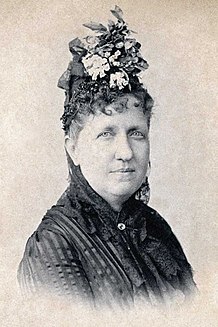Princess Imperial of Brazil
| Isabel | |||||
|---|---|---|---|---|---|
| Princess Imperial Countess of Eu |
|||||

Princess Isabel around age 41, c. 1887
|
|||||
| Head of the Imperial House of Brazil | |||||
| Tenure | 5 December 1891 – 14 November 1921 | ||||
| Predecessor | Pedro II of Brazil | ||||
| Successor | Prince Pedro Henrique | ||||
| Born |
29 July 1846 Palace of São Cristóvão, Rio de Janeiro, Empire of Brazil |
||||
| Died | 14 November 1921 (aged 75) Château d'Eu, Eu, France |
||||
| Burial | Cathedral of São Pedro de Alcântara, Petrópolis, Brazil | ||||
| Spouse | Prince Gaston, Count of Eu | ||||
| Issue |
|
||||
|
|||||
| House | Braganza | ||||
| Father | Pedro II of Brazil | ||||
| Mother | Teresa Cristina of the Two Sicilies | ||||
| Religion | Roman Catholic | ||||
| Signature | |||||
| Full name | |
|---|---|
| Portuguese: Isabel Cristina Leopoldina Augusta Micaela Gabriela Rafaela Gonzaga |
|
Styles of Isabel, Princess Imperial of Brazil |
|
|---|---|
 |
|
| Reference style | Her Imperial Highness |
| Spoken style | Your Imperial Highness |
| Alternative style | Ma'am |
Dona Isabel (English: Isabella; 29 July 1846 – 14 November 1921), nicknamed "the Redemptress", was the heiress presumptive to the throne of the Empire of Brazil, bearing the title of Princess Imperial. She also served as the Empire's regent on three occasions.
Isabel was born in Rio de Janeiro, the eldest daughter of Emperor Pedro II and Empress Teresa Cristina, and thus a member of the Brazilian branch of the House of Braganza (Portuguese: Bragança). After the deaths of her two brothers in infancy, she was recognized as her father's heiress presumptive. She married a French prince, Gaston, Count of Eu, in an arranged marriage and they had three sons.
During her father's absences abroad, Isabel acted as regent. In her third and final regency, she actively promoted and ultimately signed a law, named Lei Áurea or the Golden Law, emancipating all slaves in Brazil. Even though the action was broadly popular, there was strong opposition to her succession to the throne. Her gender, strong Catholic faith and marriage to a foreigner were seen as impediments against her, and the emancipation of the slaves generated dislike among powerful planters. In 1889, her family was deposed in a military coup, and she spent the last 30 years of her life in exile in France.
Isabel was born at 6:30 p.m. on 29 July 1846 in Rio de Janeiro's Paço de São Cristóvão (Palace of Saint Christopher). She was the daughter of Brazil's Emperor Pedro II and his wife Teresa Cristina. On 15 November the infant princess was baptized in an elaborate ceremony in Igreja da Glória (Church of Glory). Her godparents, both represented by proxy, were her uncle, King Ferdinand II of Portugal, and her maternal grandmother María Isabella of Spain.
...
Wikipedia
